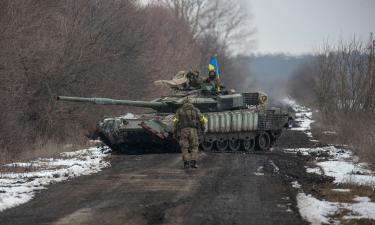Rebel leader Abdullah Ocalan says his retrial would be chance to resolve Kurdish issue
Imprisoned Kurdish rebel leader Abdullah Ocalan welcomed the European demand for his retrial, saying it will be a chance for him to demand greater Kurdish rights and a negotiated peace with his guerrilla movement, a pro-Kurdish newspaper said Friday.
But Ocalan's desire to use the trial to gain acceptance for his group, which Turkey regards as a terrorist organization, is only likely to increase public pressure to reject the European demand and could even lead Turks to question whether they want to be part of a European Union that has the power to override Turkish courts.
Ocalan's call comes as his Kurdistan Workers Party, or PKK, has become increasingly fractured and marginalized. Turks fear that he could try to use the trial to regain the momentum that his group has lost.
Turkey rejected earlier attempts to transform the group into a political force by refusing any dialogue with the group.
Today, the rebels are apparently fractured between groups that favor negotiations and those who believe they should return to the battlefield.
The PKK's main bases are in northern Iraq, where they have some 3,500 fighters, and Turkey has been pressing the U.S. Army to take action against the group. Another 1,500 fighters are believed to be inside Turkey.
Reflecting the split, the rebels have recently escalated their attacks. Three Turkish soldiers were killed Friday in an ambush in southern Turkey, local authorities said.
Turkish intelligence reports say the rebels are trying to smuggle plastic explosives into Turkey for attacks.
The European Court of Human Rights called for Ocalan's retrial Thursday, saying that the 1999 hearing that led to his conviction on treason charges was not a fair and independent trial. Turkish officials indicated that they would heed the call.
Ocalan, anticipating the ruling, told his lawyers Wednesday that Turkey should see it "as a chance given to Turkey to resolve the Kurdish question," the Web site of the pro-Kurdish Ozgur Politika said Friday.
He also said he would use a retrial as a platform to push for a democratic solution to the Kurdish problem, calling it a "democratic struggle," instead of armed struggle, the Web site said.
He said his guerrillas could decide whether to fight or not "with their free will," the newspaper reported. "If they want to be heroes, I'm not an obstacle before them."
The EU agreed late last year to open accession talks with Turkey in October, and ignoring a European court decision could jeopardize Turkey's chances for membership.
But allowing Ocalan to use the trial to promote his group would undermine decades of Turkish policy. Some 37,000 people have died in the Turkish southeast since Ocalan's group took up arms in 1984, and there are still some 75,000 Turkish soldiers and 50,000 government-paid village guards in the area.
Harsh Turkish laws that limited media freedoms were used in the past to stifle debate on the issue of Kurdish rights, laws that were only relaxed in the past year due to EU pressure.
Allowing the trial is likely to fray nerves in Turkey, where Ocalan is regarded as a terrorist. Some went so far as to say Turkey should risk giving up its EU membership dream if it meant retrying Ocalan.
"Tell the world immediately that Ocalan will not be retried, even if it means putting the EU membership in danger," wrote Emin Colasan, a columnist in the Hurriyet newspaper.
"Turkey cannot digest this retrial," Colasan said. "What is at stake is the pride of the Turkish nation."
Gen. Hursit Tolon, the commander of the 1st Army based in Istanbul, said Friday that "this decision means that 'I don't recognize your courts and constitution."'
Nationalist sentiments are already on the rise in Turkey, largely as a reaction to EU demands that Turkey address many previously taboo subjects, such as minority rights for Kurds and the mass killings of Armenians during the collapse of the Ottoman Empire.
Turkey regards all Muslims, including Kurds, as Turks. Prior to 1991 it was illegal to speak Kurdish.
Nationalist sentiments are likely to skyrocket if there is a retrial that is used by Ocalan to promote his separatist group. Hundreds of nationalists marched in Istanbul, Ankara and other cities Friday to protest the court ruling.
"The retrial of the terrorist chief would turn Turkey upside down," said former Deputy Premier Devlet Bahceli, the head of the Nationalist Movement Party.
Ocalan was captured in Kenya in 1999 and flown to Turkey, where he was sentenced to death for treason for leading the rebel group. The punishment was commuted to life in prison after Turkey abolished the death penalty under EU pressure.
SELCAN HACAOGLU, Associated Press Writer
Subscribe to Pravda.Ru Telegram channel, Facebook, RSS!





